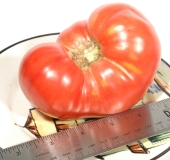
 3
3




 5
5




"Study books and observe nature; if they do not agree, throw away the books." ~ William A. Albrecht
 5
5




Cargo bikes are cool
 8
8






 5
5




sow…reap…compost…repeat
 9
9




Amy Gardener wrote:Start by assuming that your garden is a tomato disease vector, the disease is traveling far and wide, and you’ve got to manage this plague. If you have to compost the material in your yard, carefully bury the diseased bodies in your existing tomato garden, put a marker up that says, NO NIGHTSHADES HERE UNTIL 2027. Six years of alternate or cover crops could naturally clean up this area. Wash your tools in water and allow the water to go into your contaminated zone. Now disinfect your pruners, your rakes, your cart and all other gear using ethanol and a hand held blow torch for metal surfaces. Given the spread of disease beyond the tomato garden, I’d either skip tomatoes entirely next year, or plant disease resistant varieties as far from this year’s as possible. Don’t infect your compost: the heat will not kill spores. Take this problem seriously so you will have awesome tomatoes in the future.
 5
5




“The most important decision we make is whether we believe we live in a friendly or hostile universe.”― Albert Einstein
 5
5




Living a life that requires no vacation.




Mike Bruner wrote:Or even putting a lid on that drum and making biochar out of it maybe?
May the Forest be with you,
Tavonna Nira
 4
4




Nothing ruins a neighborhood like paved roads and water lines.
 2
2




 3
3




 2
2




This is all just my opinion based on a flawed memory

 1
1




 1
1




Debbie Ann wrote:What an interesting idea. “What would be the best way to breed tomato pests/diseases? Grow only tomatoes! Even more effective would be growing only one variety, or highly inbred cultivars bred in near sterile conditions. What would be the best way to breed predators of tomato pests/diseases? Compost them 'non-thermophylically' (cool and slow), so as to breed the organisms that eat the problem organisms. “
I guess that's one way to fix the problem. I think that is probably the very best solution. Just let Mother Nature fix the problem. She's way better at doing these things than we are!
But that made me ask so many questions! Are there currently natural, organic predators of these viruses, bacterial wilts and diseases that we know about? Why hasn't anyone ever mentioned them before? When will they show up? How long will this take? I'm pretty old and I want to keep growing and enjoying my tomatoes as much as possible. In fact, I would like to have more each year, not less. I would worry that Mother Nature might not fix the problem while I am still around. Did she get the memo? She might not get around to it while I'm still here or even when my kids and grand kids are still around. What if she doesn't think it's a big deal or doesn't like tomatoes and doesn't bother to fix the problem anytime soon? What then? It sounds like an awesome solution but I might not get to enjoy the bounty of it! I don't like the sound of that!
“Challenges are what make life interesting and overcoming them is what makes life meaningful."
“The pain you feel today is the strength you feel tomorrow. For every challenge encountered, there is opportunity for growth.”
“There are no great people in this world, only great challenges which ordinary people rise to meet.”
I don't think I just want to sit around and wait for Mother Nature to fix 'Climate Change' either. She might not care so much that humans survive or are happy. I think we need to do our part too, just in case. Just saying..... I'll have to think about this some more.
 1
1




Nick & Jane
You are most welcome to visit our blog at ALEKOVO.COM.
 2
2





|
woof woof woof tiny ad woof woof
Learn Permaculture through a little hard work
https://wheaton-labs.com/bootcamp
|





